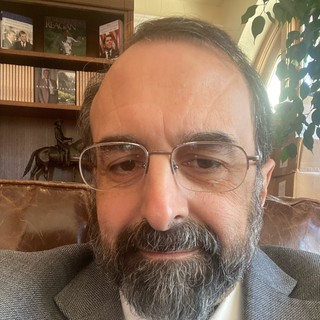The term “Judeo-Christian” has been in common use for decades to refer to the Biblical heritage of America and the West in general, but if one French intellectual gets his way, we will soon be referring instead to our “Islamo-Christian” heritage. When one surveys the world in which jihadis have just taken over Afghanistan and are emboldened everywhere, and an ostentatiously Roman Catholic president’s Justice Department files suit against a state of the United States for daring to restrict abortion, maybe “Islamo-post-Christian” would be more apt. But in any case, the French intellectual Charles Saint-Prot, a professor at the Institute of International, European and Comparative Law in Paris and an expert on Islamic law, is pushing for the “Islamo-Christian” term. Because the Christian and post-Christian West and the Islamic world have so very much in common, you see.
It has long been taken for granted that it was Judaism and Christianity that had so much in common. Back in 1960, Martin Luther King, Jr. denounced racism as a “cancerous disease that prevents us from realizing the sublime principles of our Judeo-Christian tradition.” But now, according to the French-language Riposte Laïque, Charles Saint-Prot wants the West to look to a different shared heritage, the one the West supposedly shares with Islam.
The thesis of Saint-Prot’s work is “Islam is a harmless religion,” and “if there are any lingering hiccups, they shouldn’t be taken too seriously.” He rejects the idea of a “Judeo-Christian culture,” and instead recommends use of the term “Islamo-Christianity,” as the two are, he says, “sister religions with very few differences.” Saint-Prot also claims that “Islam did not harbor any particular hostility against Christianity.” He is not just talking about terminology for its own sake. Saint-Prot “now proposes an economic alliance with the Maghreb countries, particularly Morocco, convinced that France’s future is here.”
While Charles Saint-Prot is hardly a household name, his views on this are shared by all too many on both sides of the Atlantic, and elsewhere. He is by no means the first to suggest a shift in terminology to reflect an embrace of Islam by the West. As far back as 2003, Agha Saeed of the American Muslim Alliance recommended that the U.S. government and media begin speaking of “Judeo-Christian-Islamic values” rather than “Judeo-Christian values,” and should do so “in all venues where we normally talk about Judeo-Christian values, starting with the media, academia, statements by politicians and comments made in churches, synagogues and other places.”
Much more recently, in August 2020, The Atlantic ran a piece complaining that “the ‘Judeo-Christian tradition’ excluded not only Muslims, Native Americans, and other non-Western religious communities, but also atheists and secularists of all persuasions…The mythical ‘Judeo-Christian tradition,’ then, proved an unstable foundation on which to build a common American identity.” The Atlantic didn’t call for the adoption of the term “Islamo-Christian values,” but clearly it likely wouldn’t have any problem with it, either.
Contrary to Saint-Prot, however, including “Islamic” among our core values would be problematic in all sorts of ways. Take, for example, Thomas Jefferson, the most famous non-Christian among the Founders, who despite his lack of Christian faith once wrote, “The philosophy of Jesus is the most sublime and benevolent code of morals ever offered to man. A more beautiful or precious morsel of ethics I have never seen.” It is hard to see how such words can be applied with equal accuracy to a creed that, instead of telling people to love their enemies (Matthew 5:44), tells them to be “harsh” or “ruthless” to those who do not believe (Qur’an 48:29).
Not only do Christianity and Islam differ markedly in moral and ethical as well as dogmatic content, but Islam, as we saw vividly on September 11, 2001, contains a supremacist impulse that rejects the very notion of equal coexistence with non-Muslim value systems; it must dominate. As The History of Jihad explains, Jefferson and John Adams noted this tendency back in 1786, after their meeting with Sidi Haji Abdul Rahman Adja, Tripoli’s ambassador to Britain. While trying to negotiate a settlement to end raids on American ships by Barbary pirates, Adams and Jefferson asked the ambassador how he could justify such attacks. Adja replied, as they explained in their report to the Continental Congress, “that it was founded on the Laws of their Prophet, that it was written in their Koran, that all nations who should not have acknowledged their authority were sinners, that it was their right and duty to make war upon them wherever they could be found, and to make slaves of all they could take as Prisoners, and that every Musselman who should be slain in Battle was sure to go to Paradise.”
Charles Saint-Prot likely knows all this and more, and, like so many other Western intellectuals, doesn’t care. Others don’t know any of it at all, or profess not to. Back in 2008, a senator from Delaware named Joe Biden claimed that “to compare terrorism with an all-encompassing ideology like communism and fascism is evidence of profound confusion.” Is that so, Joe? Biden’s handlers would be doing Old Joe a big favor now if they would remind him, in the time remaining before the twentieth anniversary of 9/11, of Sidi Haji Abdul Rahman Adja’s words and their enduring significance. But that would require Biden’s handlers to know about them to begin with. It’s much more likely that they’ve been reading the likes of Charles Saint-Prot.
Related: Why Did the State Department Want to Keep Private American Citizens From Leaving Afghanistan?









Join the conversation as a VIP Member